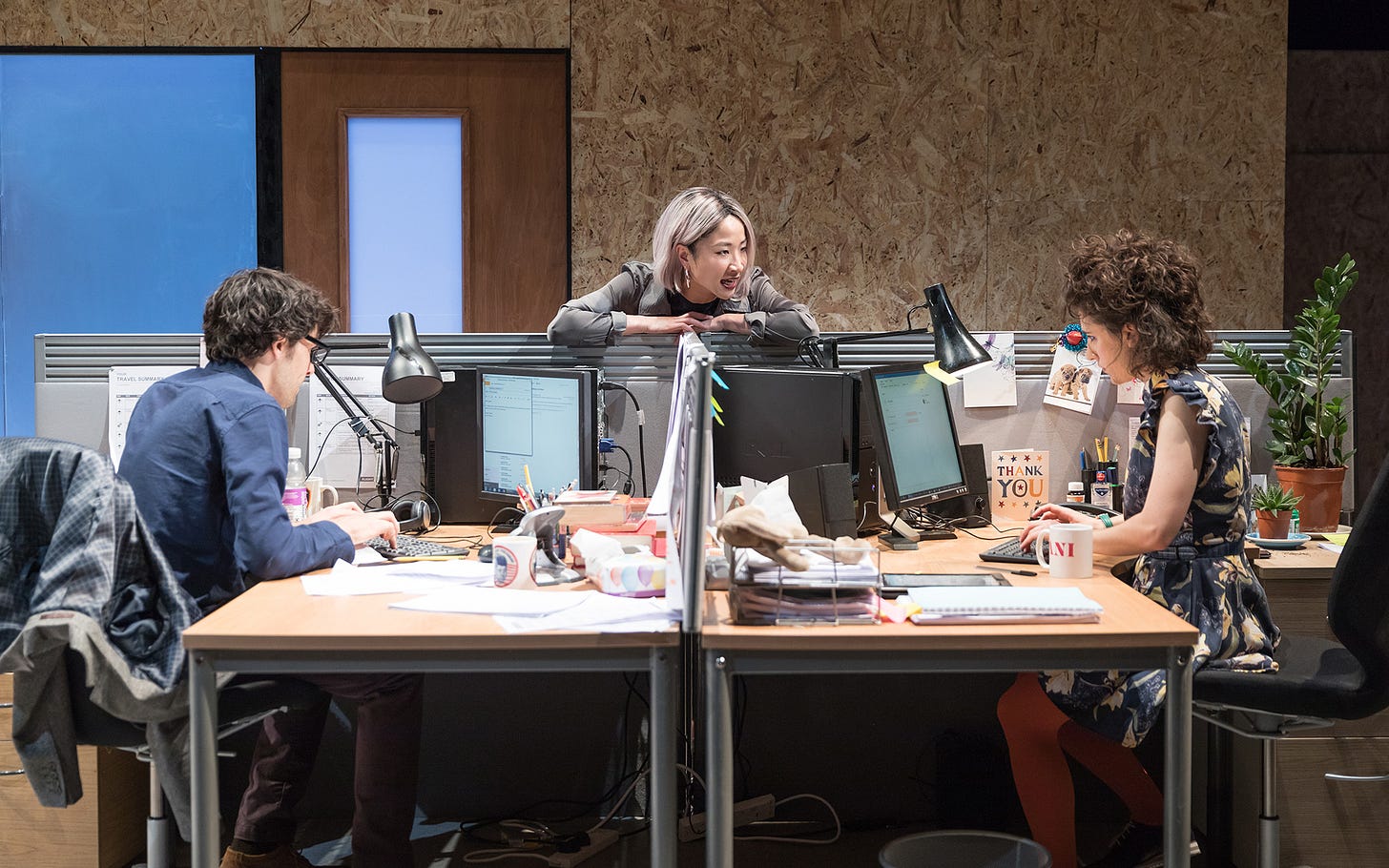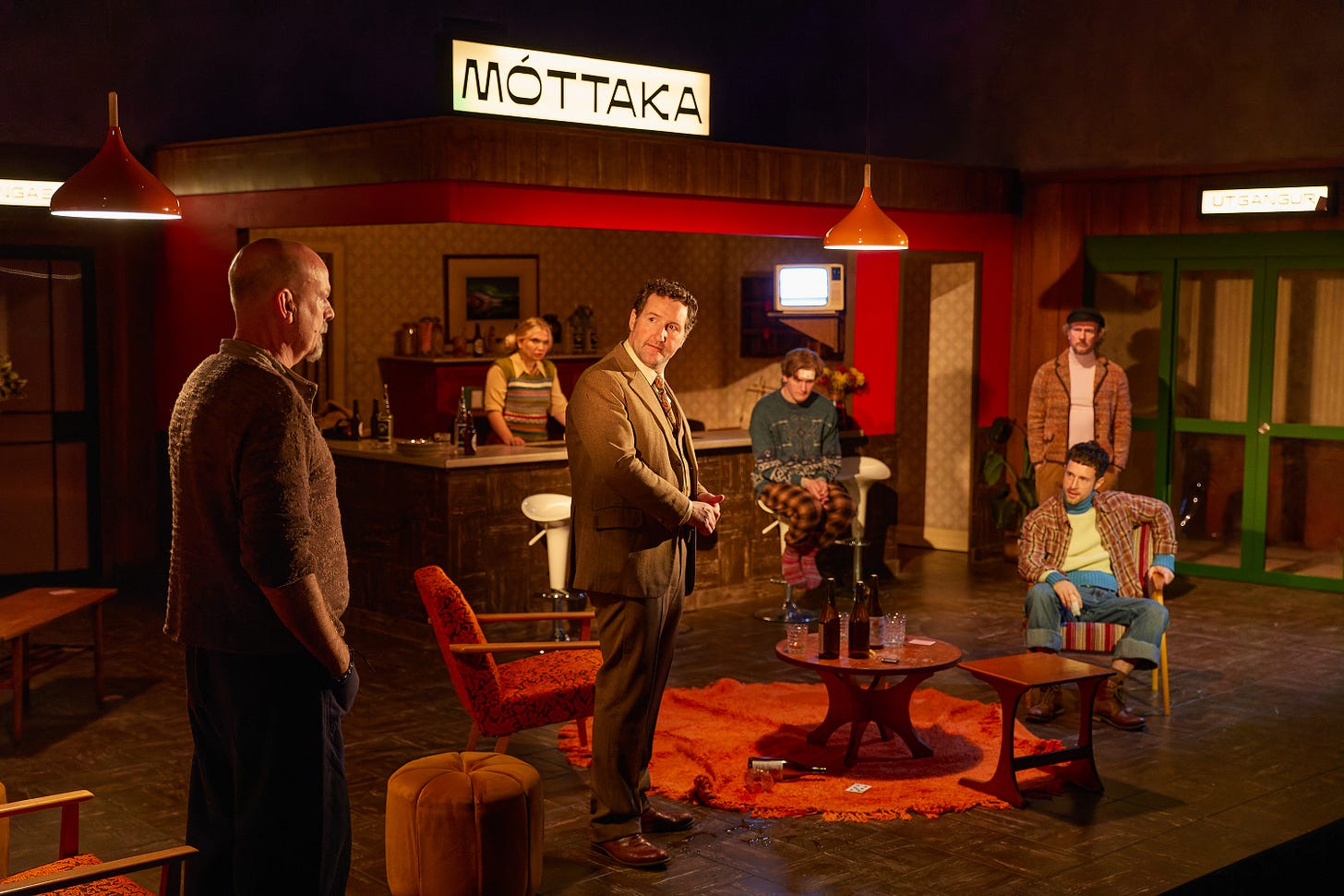Head up out of Swiss Cottage station, walk past the food stalls, and you’ll find yourself confronted with the contemporary structure of the Hampstead Theatre.
It’s not a showy building, but inside contains a box of delights. In my PowerPoint of favourite London theatres - of course there’s a PowerPoint - the Hampstead Theatre has a reserved seat. Over the past decade, I’ve seen 45 plays across its two stages, but in recent years funding cuts and the loss of an Artistic Director have left the space struggling to live up to its legacy.
What follows is said with love. I’m not angry, just disappointed, and worried about what happens next.
Losing the Plot
As with most things, the Tories are to blame. In late 2022 the Hampstead Theatre was one of many to suffer from brutal funding cuts. Hampstead lost its entire annual Arts Council grant and this dent to the budget translated to a dent in the theatre’s identity as a whole. The theatre announced it could “no longer continue solely as a new writing theatre,” and within months, Artistic Director Roxana Silbert stepped down and has never been replaced. The final nail in the coffin was the closing of the theatre’s literary department. What had once been a key pipeline for new playwrights suddenly dried up.
Since then the quality has been wavering. Hampstead has pivoted away from new writers in search of more commercially viable offerings featuring more revivals, recognisable names, and less risky shows. But sadly, “make more money” doesn’t work as a business plan, especially when combined with departing creative leadership. Rather than turn into a commercial powerhouse attracting large audiences to enticing shows, the Hampstead has completely lost its edge. Reviews have been largely underwhelming and a series of poorly reviewed - or worse, forgettable - shows isn’t going to be good for cash flow. If the new strategy is to bring in paying audiences, they aren’t be offered much worth paying for.
The recent East is South was a production that promised to be a tense thriller but fell completely flat. My review is slightly clouded by drama in the audience but other (real) critics seemed to agree. The Standard called it "a waste of acting talent," WhatsOnStage went for a “frustratingly scattered piece of work,” and TimeOut said that the production “stumbles under the weight of its determination to say Big Things.” And this was written by Beau Willimon; an Oscar nominated writer and seemingly safe bet.
The Glory Days
This is a far cry from the theatre I fell in love with only a few years ago. I remember being mesmerised by Gloria in 2017 - a satire on office culture and the media that contained a twist so shocking that part of the programme was sealed to prevent spoilers. Audiences had to wait until the end of the first act for ushers to unseal the sections so they could be read while downing the interval ice-cream. This was my introduction to playwright Branden Jacobs-Jenkins who I have gone on to see at the National, the Donmar, and even on Broadway last year. I discovered new writing at the Hampstead Theatre - I deserve a sticker.
And let’s not forget The Humans in 2018. A transfer from Broadway to this relatively small London stage felt like a big deal and the show itself was a revelation. A whole New York apartment filled the stage as a family’s dynamics were put under the spotlight during a makeshift Thanksgiving get together. Despite arriving as a success, its presence on this particular stage felt fresh and bold. Stephen Karam’s play was poignant and spooky - one I hope I never forget.
What these highlights share is that they are now several years old. The recent run of shows simply can’t compare. Despite occasional successes - Reykjavik being the most recent glimmer of hope - the quality on the main stage just isn’t the same. The fact that they can still pull off a play like Reykjavik (strange, engrossing, and deeply atmospheric) is proof that the Hampstead isn’t beyond hope. Undermining this praise is the fact that the play was written by Richard Bean, a well-established name, which only highlights the theatre’s struggle to nurture new voices on the main stage. Occasional successes aside, the Hampstead no longer seems to be able to find a consistent source of quality shows to fill their main auditorium.
Brilliance in the Basement
The spirit of the Hampstead Theatre is not completely lost though. Down below the café is the Downstairs theatre - a smaller, more adaptable space where new writers are given freer rein to try something different. It’s just a shame that the theatre’s most innovative and exciting work is relegated to the basement. The Habits, Jack Bradfield’s debut play, centred on a group of Dungeons & Dragons players and had that scrappy, offbeat energy Hampstead used to do so well. In my review, I called it "an absolute joy of a production" that captured the intimacy and weirdness of its subject matter perfectly. It felt like Hampstead at its best; experimental yet accessible - the sort of show you can recommend to a friend as a gem you’ve discovered yourself.
Sadly successes in the Downstairs space aren’t going to keep the whole venue afloat. I desperately want the Hampstead Theatre to succeed but can’t see how much longer it can go down this path. Audiences can forgive the odd flawed new play but repeated misfires will leave people less likely to take a risk on spending an evening in NW3.
Lessons from the Royal Court
To show that it is possible to stick to your principles and run a thriving theatre, let’s take a short detour to the Royal Court. Sitting in Sloane Square - this space has faced its own challenges over the years. Until recently the Royal Court was seen as having lost its focus on new writing, but since David Byrne took over as Artistic Director in 2024, the theatre has doubled down on its founding mission of producing bold, experimental new work. His inaugural season included ten Royal Court debuts and the results speak for themselves.
I loved More Life; a strange/ hilarious/moving interrogation of tech and mortality that East is South simply wasn’t. A Good House meanwhile examined race, gentrification, and the lies we tell ourselves - with a healthy dose of magical realism. These plays weren’t perfect but they were something completely new. And let’s not ignore the three Olivier Awards won by Giant earlier this month. When a theatre has a dedicated Artistic Director with a clear vision, it can thrive.
I realise this has been quite a long rant, but I don’t want Hampstead to disappear into a haze of mediocrity. I want it to get weird again; to risk falling on its face on the main stage, and ultimately for it to succeed. Right now, I can’t see how it can do that without filling some of those vacancies and building back its creative team.
Come on Hampstead Theatre, don’t make me take you out of the PowerPoint.







